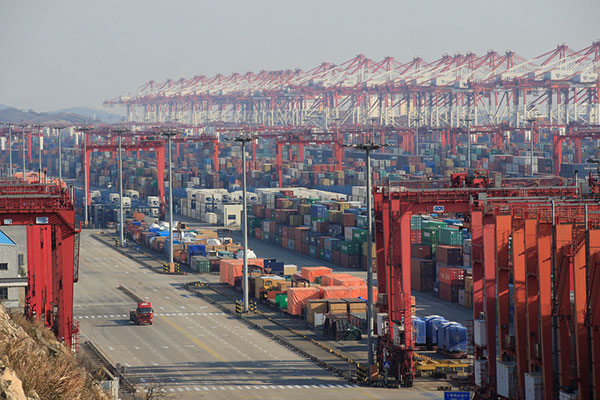Trump team eases trade war worries


Their words came just hours after China announced it would slap 25 percent tariffs on 106 US products, worth $50 billion, ranging from soybeans and cars to whiskey and airplanes, in response to the 25 percent tariff on 1,300 Chinese products worth $50 billion announced by the US Trade Representative on Tuesday, following a Section 301 investigation into China's intellectual property policies and practices.
Amid speculation that a major tariff war may not materialize, the Dow Jones Industrial Average fluctuated dramatically on Wednesday, plunging 501 points after the opening bell, but closing the day on a 230-point rise to 24,263. The S&P 500 also closed the day up 1.16 percent.
Chinese Ambassador to the US Cui Tiankai met on Wednesday with US Acting Secretary of State John Sullivan at the State Department.
Cui urged the US side to abandon its unilateral and protectionist practices and terminate the 301 investigation as early as possible, and seek a solution through dialogues and consultations with the Chinese side.
In an interview with CNBC aired on Wednesday, Cui said the US Section 301 tariffs will have a negative impact on both the Chinese and US economies.
"Such protectionism would not protect anybody," Cui said. "It will not protect American workers or American farmers. It will not protect American businesses or American consumers. Actually it will hurt everybody, including the US economy itself."
Cui dismissed US accusations of forced technology transfer in China as "groundless", saying the US has never given China specific cases of such allegations.
He said China was always ready to continue and intensify its dialogue and communication with the US side on any possible economic or trade issue.
"But, we need reciprocity. Our goodwill has to be met by the same degree of goodwill," he said.
Cui warned that if anybody tries to hurt the interests of the Chinese people, China will certainly fight back.
David Dollar, a senior fellow at the John L. Thornton China Center of the Brookings Institution, described tariffs as the wrong instrument to address US-China issues.
"Tariffs will cause a lot of unnecessary pain for consumers and third countries, not to mention American firms caught in the crossfire," he said in an article coauthored with his colleague Zhi Wang posted on the Brookings website on Wednesday.
Some of the cost will be borne by American consumers; some by American firms that either produce in China or use intermediate products from China; some by firms in countries (mostly US allies) that supply China; and some by Chinese firms (mostly private ones), they wrote.
Scott Lincicome, an adjunct scholar at the Cato Institute and an international trade attorney, said Trump's implemented tariffs are already causing real pain for US companies and farmers forced to cope with sudden and unexpected high prices and new tariffs as well as chaos in various markets.
He warned in a tweet on Wednesday that the US acting outside the global trading system will place the already-weakened World Trade Organization under more strain.































